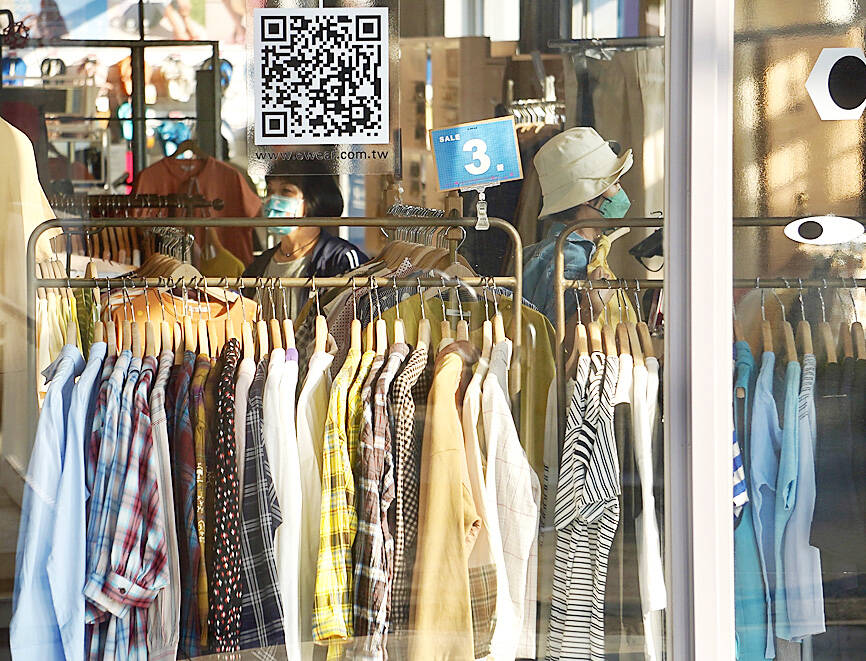Taiwan’s business climate monitor last month turned “yellow-blue” for the second straight month as major economic barometers stayed in “slowdown mode” due to economic headwinds abroad, the National Development Council (NDC) said yesterday.
The overall score gained 1 point to 18, as imports of electrical and machinery equipment displayed positive movements, the council said, adding that whether the rise would continue this month is uncertain.
“Both leading and coincident indicators continued to decline, although the pace eased,” NDC research director Wu Ming-huei (吳明蕙) told a news conference in Taipei.

Photo: CNA
The general downtrend suggests the economy remains soft and warrants close attention, Wu said.
The council uses a five-color system to indicate the state of the nation’s economy, with “green” signifying steady growth, “red” suggesting a boom and “blue” reflecting a recession. Dual colors indicate a shift to a stronger or weaker state.
Active purchases of capital equipment by local semiconductor manufacturers enabled the business monitor to steer away from the recession path, the official said.
Taiwan is home to the world’s largest contract chipmakers, supplying 60 percent of advanced chips used in high-performance computing, flagship smartphones and data centers.
The Christmas season in the West and the Lunar New Year in Asian countries would support sales of consumer electronic products, although high inflation and monetary tightening could curtail demand, the council said.
The index of leading indicators, which aims to predict the economic situation in the coming six months, weakened 0.97 percent to 95.63, as all sub-indices registered negative cyclical movements except for the reading on imports of semiconductor equipment, the council said.
Major local semiconductor firms said they are also taking a hit from order cancellations and inventory adjustments by global clients, but the magnitude is limited.
The index of coincident indicators, which reflects the current economic situation, decreased 1.34 percent to 95.05, as all comprising gauges fell, with the exception of non-farm payroll, it said.
The end of graduation season and an ongoing recovery in tourism sectors shored up hiring activity, it said.
Service providers catering to domestic demand could see business improvement, but operators linked to exports and financial markets are looking at a cold winter and spring, it said.

KEEPING UP: The acquisition of a cleanroom in Taiwan would enable Micron to increase production in a market where demand continues to outpace supply, a Micron official said Micron Technology Inc has signed a letter of intent to buy a fabrication site in Taiwan from Powerchip Semiconductor Manufacturing Corp (力積電) for US$1.8 billion to expand its production of memory chips. Micron would take control of the P5 site in Miaoli County’s Tongluo Township (銅鑼) and plans to ramp up DRAM production in phases after the transaction closes in the second quarter, the company said in a statement on Saturday. The acquisition includes an existing 12 inch fab cleanroom of 27,871m2 and would further position Micron to address growing global demand for memory solutions, the company said. Micron expects the transaction to

Vincent Wei led fellow Singaporean farmers around an empty Malaysian plot, laying out plans for a greenhouse and rows of leafy vegetables. What he pitched was not just space for crops, but a lifeline for growers struggling to make ends meet in a city-state with high prices and little vacant land. The future agriculture hub is part of a joint special economic zone launched last year by the two neighbors, expected to cost US$123 million and produce 10,000 tonnes of fresh produce annually. It is attracting Singaporean farmers with promises of cheaper land, labor and energy just over the border.

US actor Matthew McConaughey has filed recordings of his image and voice with US patent authorities to protect them from unauthorized usage by artificial intelligence (AI) platforms, a representative said earlier this week. Several video clips and audio recordings were registered by the commercial arm of the Just Keep Livin’ Foundation, a non-profit created by the Oscar-winning actor and his wife, Camila, according to the US Patent and Trademark Office database. Many artists are increasingly concerned about the uncontrolled use of their image via generative AI since the rollout of ChatGPT and other AI-powered tools. Several US states have adopted

A proposed billionaires’ tax in California has ignited a political uproar in Silicon Valley, with tech titans threatening to leave the state while California Governor Gavin Newsom of the Democratic Party maneuvers to defeat a levy that he fears would lead to an exodus of wealth. A technology mecca, California has more billionaires than any other US state — a few hundred, by some estimates. About half its personal income tax revenue, a financial backbone in the nearly US$350 billion budget, comes from the top 1 percent of earners. A large healthcare union is attempting to place a proposal before